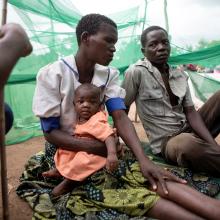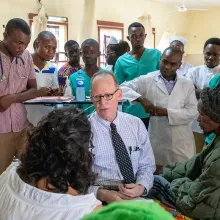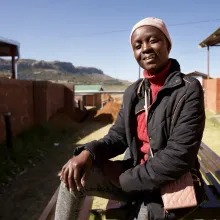The fight against tuberculosis (TB) is in crisis, but we still have a chance to make a difference. Service disruptions, severe funding cuts, and the threat of drug-resistant TB have put millions at risk. These setbacks have cut off lifesaving medication and support for countless people battling the world’s deadliest infectious disease. For World TB Day, Partners In Health hosted the webinar “Turmoil, TB Care, & Taking Action,” bringing together experts, authors, and advocates to discuss the impact of these cuts and explore ways to push forward.
Here are the top five key takeaways, where you’ll discover why urgent action and long-term solutions are crucial in the fight against TB.
1. A Looming Global Health Crisis: Disruptions to TB Care Are Widespread
The World Health Organization (WHO) recently reported alarming disruptions to TB services in 27 countries, with nine facing severe drug shortages. These setbacks, combined with major funding cuts, have severely hindered the global fight against TB. Research is in crisis, with delays in diagnostics, treatments, and vaccines slowing progress. The situation has worsened as the U.S. withdraws USAID funding, and the United Kingdom and the Netherlands reduce their aid. Without urgent action, TB-related deaths could rise by as many as 2.2 million.
2. Aid Cuts Are Disrupting Treatment
In a recent interview, John Green talked about how, without USAID funding in countries like Sierra Leone, thousands are losing access to treatment, raising the risk of drug-resistant TB, which is dangerous for both individuals and society. The halt in USAID funding has interrupted lifesaving TB treatment in Sierra Leone, leaving many at risk of missing vital medications. This increases the chance of drug-resistant TB developing, which is a much greater threat to both individuals and the wider community. As more people go untreated, the spread of TB becomes more challenging to control. Additionally, disruptions to diagnostic services and surveillance systems are preventing healthcare professionals from effectively tracking TB, leading to delayed diagnoses and a rise in transmission rates globally.
The sudden funding cuts have left countries scrambling to fill the gap without warning or consultation. The lack of a transition period has made this abrupt end to aid particularly troubling. If there had been time to plan and mobilize resources, countries could have better strategized for survival. Instead, nations are now struggling to maintain TB care, further deepening the global health crisis.
3. Health Worker Shortages Are Straining Services
Staffing cuts are only making things worse as health workers are being laid off, leading to disrupted services for TB patients who rely on essential care. Clinics, now operating with fewer personnel, are overwhelmed and can only focus on emergency cases, leading to a collapse in screenings, contact tracing, and testing. Delayed diagnostics leave patients at risk of worsening conditions, while weakened data and surveillance systems make it even more challenging to track and manage TB effectively. Dr. Melino Ndayizigiye, Executive Director of PIH Lesotho, highlighted the impact in Lesotho, where layoffs have forced clinics to operate with half their usual staff. As a consequence, TB transmission is expected to rise, worsening the global health crisis.
4. Solidarity and Global Cooperation Are Essential for Immediate Action
Global solidarity is essential in the fight against TB. Several countries, including activists in South Africa and the governments of Lesotho and Nigeria, have stepped up to increase their domestic investments in TB care, underscoring the importance of collective action. Dr. Ndayizigiye highlighted Lesotho’s efforts to sustain TB care by placing laid-off healthcare workers on the government payroll, an approach that international donors like the Global Fund and the World Bank should support to strengthen primary healthcare.
Solidarity extends to international cooperation and resource sharing, with opportunities for cross-border support. Dr. Ndayizigiye emphasized the need for a more independent and sustainable funding model for TB care, suggesting strategies like health swaps, such as supplying generic medications and sharing technology, can help produce affordable TB treatments locally or through South-South solidarity and resource sharing. Countries can better secure TB services and respond effectively to future health crises by creating resilient funding mechanisms. The private sector also has a crucial role in supporting TB programs through corporate social responsibility (CSR) initiatives.
The current crisis highlights the consequences of chronic underfunding and the potential of global solidarity. By working with governments, donors, civil society, and the private sector, we can ensure that lifesaving TB care reaches those in need.
5. There is Hope: Innovation and Investment Can Help Eliminate TB
Despite the current challenges, there is hope. Dr. Ndayizigiye shared inspiring stories of innovation in TB care. New technologies, like artificial intelligence for TB detection, have significantly improved diagnostic rates in rural, hard-to-reach clinics in recent years. PIH Lesotho has seen detection rates rise from 37% to 93% by decentralizing molecular TB tests and integrating these tools into primary healthcare. This progress shows that creativity and investment in primary healthcare make lifesaving results possible.
The webinar reinforced a powerful truth: through solidarity, innovation, and collaboration, TB elimination is within reach. Your support is crucial in strengthening healthcare systems and overcoming this challenge together.
How You Can Help
During the webinar, attendees asked how they, whether individuals, healthcare workers, or global citizens, can contribute to the fight against TB. The answer is clear. We all have a role. Ordinary people can raise awareness, advocate for funding, and support grassroots initiatives. Healthcare workers and researchers can share expertise and collaborate on local projects. Countries in the Global South can exchange strategies and solutions to strengthen TB care.
Solidarity starts with awareness. A simple conversation, “Hey, I heard this today, and it’s wrong. What can we do in our community?” can spark action. People worldwide can advocate for their governments to increase funding and commitment to global TB efforts.
While disruptions to TB care are alarming, solutions are within reach if we act now. By strengthening solidarity, increasing investment in primary healthcare, and embracing innovation, we can reverse the tide of TB and save millions of lives. The time to act is now; let’s work together to build a healthier future for all.



